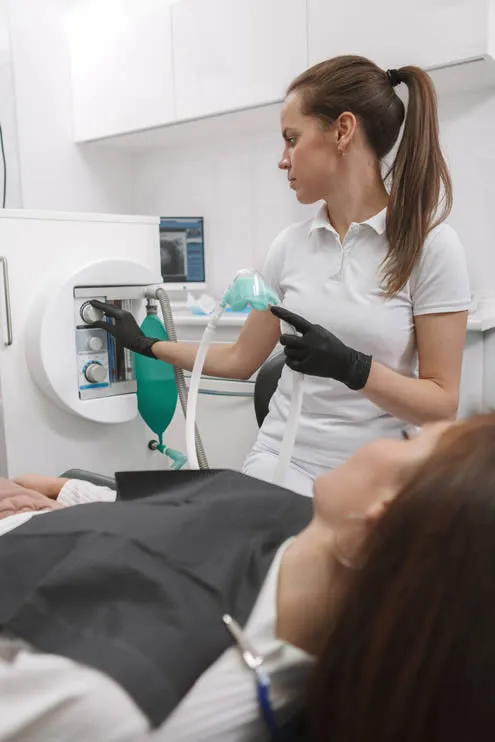Are you one of the many people who dread going to the dentist? Does the mere thought of a dental procedure make you anxious or fearful? If so, sedation dentistry may be the solution you’ve been looking for. With the help of sedatives, you can experience pain-free and stress-free dental procedures. Sedation dentistry has revolutionized the way people receive dental care, allowing individuals to overcome their fear and anxiety and get the treatment they need. If you’re someone who’s been avoiding the dentist and putting off dental treatment for a long time you can finally overcome your fear and get the dental care you need. Don’t let fear hold you back from achieving a healthy, beautiful smile – explore the benefits of sedation dentistry.
What is sedation dentistry?
Sedation dentistry is a valuable tool for patients who struggle with dental anxiety or phobia, as well as those who require complex or lengthy dental procedures. Different types of sedation can be used to help patients feel more relaxed and comfortable during their treatment, depending on their individual needs and the complexity of the procedure.
Laughing gas: One of the most common types of sedation used in dentistry is laughing gas. Laughing gas is inhaled through a mask placed over the patient’s nose, and it produces a mild, calming effect that helps to reduce anxiety and discomfort. It is a safe and effective method of sedation that wears off quickly, allowing patients to drive themselves home after the procedure.
Oral sedation: Another type of sedation commonly used in dentistry is oral sedation. This involves taking a pill before the procedure to induce drowsiness and relaxation. Oral sedation is a great option for patients who have more severe dental anxiety or who need a deeper level of sedation than laughing gas can provide. It can also be helpful for patients who have difficulty sitting still for long periods of time or who need extensive dental work.
Intravenous (IV) sedation: This is an option for patients who require a deeper level of sedation. IV sedation involves administering sedatives directly into the bloodstream through an IV line, which produces a more profound state of relaxation than laughing gas or oral sedation. This method is often used for more complex procedures or for patients with severe anxiety or fear of dental treatment.
General anesthesia: This type of sedation renders the patient completely unconscious, and is done in a hospital setting. It allows the dentist to perform the necessary dental work without any discomfort or awareness on the patient’s part. This type of sedation is typically reserved for more complex procedures or for patients with physical or cognitive disabilities.
Your sedation options depend on the your individual needs and the complexity of the procedure. Our dentist will discuss the options with you and help you make an informed decision.
What to expect during sedation
What to Expect with laughing gas
When laughing gas is administered, the first step is for the dentist or dental assistant to fit a small mask over the patient’s nose. The mask is connected to a machine that delivers a mixture of laughing gas and oxygen. The patient will then breathe normally through the mask, inhaling the gas mixture. Within a few minutes, the patient will begin to feel the effects of the gas, which include a mild sense of euphoria and a feeling of relaxation. The dentist or dental assistant will monitor the patient’s response to the gas and adjust the mixture as needed to ensure that the patient remains comfortable throughout the procedure. Once the procedure is complete, the mask is removed and the patient is monitored until the effects of the gas wear off completely.
What to Expect with Oral Sedation
During oral sedation, the patient takes a pill before the procedure, typically about an hour before the appointment. The sedative medication induces a state of drowsiness and relaxation, helping the patient to feel more at ease during the procedure. Patients who undergo oral sedation will typically remain awake and aware, but may feel groggy and have impaired memory of the procedure. It’s important to arrange for a trusted friend or family member to drive the patient home after the procedure, as the sedative effects can last for several hours. Your dentist will provide you with specific instructions to follow before and after the procedure to ensure the best possible outcome.
More Questions about Sedation?
Contact our office today to schedule a consultation. We can answer any question you have about sedation and address any issues unique to your specific situation. We look forward to seeing you.
Why is sedation dentistry so important?
According to the American Dental Association (ADA), approximately 22% of American adults (age 18 and over) avoid going to the dentist due to fear or anxiety. This means that nearly 1 in 4 adults in the United States are not receiving the dental care they need, which can lead to a host of dental problems and potential health issues.
Sedation dentistry is important because it allows patients who struggle with dental anxiety or phobia to receive the dental care they need without undue stress or discomfort. If you struggle with dental anxiety, it’s time to call Heath Springs SC Dentist for a consult. We can go over all of your sedation dentistry options.
Reasons for sedation dentistry
Dental anxiety or phobia
Many people experience anxiety or fear related to dental visits or procedures, which can make it difficult for them to seek dental care or undergo necessary procedures. Sedation dentistry can help to alleviate this anxiety and promote relaxation, making it easier for patients to receive the care they need.
Fear of needles or drills
Some patients may be afraid of needles or drills, which are commonly used in dental procedures. Sedation dentistry can help to reduce anxiety related to these instruments, making the experience more comfortable and less stressful.
Sensitive teeth or gums
Patients with sensitive teeth or gums may experience discomfort during dental procedures, which can make it difficult to undergo necessary treatment. Sedation dentistry can help to reduce this discomfort and promote relaxation during procedures.
Low pain threshold
Patients with a low pain threshold may experience significant discomfort during dental procedures, which can make it difficult to undergo necessary treatment. Sedation dentistry can help to reduce pain and promote relaxation during procedures, making the experience more comfortable.
Strong gag reflex
Some patients may have a strong gag reflex, which can make it difficult to undergo certain dental procedures. Sedation dentistry can help to reduce this reflex, making the experience more comfortable for the patient.
Difficulty sitting still
Some patients may have difficulty sitting still for long periods of time, which can make it difficult to undergo complex or lengthy dental procedures. Sedation dentistry can help to promote relaxation and reduce discomfort, making it easier for patients to remain still during procedures.
Complex dental procedures
Some dental procedures can be complex or lengthy, requiring significant time and effort from the patient. Sedation dentistry can help to make these procedures more comfortable and less stressful for the patient.
Previous negative dental experiences
Patients who have had negative experiences with dental care in the past may be reluctant to seek treatment or undergo necessary procedures. Sedation dentistry can help to alleviate anxiety related to these experiences and promote relaxation during future procedures.
Physical or cognitive disabilities
Patients with physical or cognitive disabilities may have difficulty undergoing dental procedures without assistance. Sedation dentistry can help to promote relaxation and reduce discomfort, making it easier for these patients to receive the care they need.
Traumatic dental injury or PTSD
Patients who have experienced traumatic dental injuries or who have post-traumatic stress disorder (PTSD) may experience anxiety or fear related to dental procedures. Sedation dentistry can help to alleviate this anxiety and promote relaxation during procedures, making it easier for patients to receive necessary care.
More Questions about Sedation Dentistry?
Some of the most common dental services performed with sedation dentistry include root canals, tooth extractions, dental implants, and complex restorative procedures.
Contact our office today to schedule a consultation. We can answer any questions you have about sedation dentistry options and address any issues unique to your specific situation. We look forward to seeing you.
ADDITIONAL FREQUENTLY ASKED QUESTIONS ABOUT SEDATION DENTISTRY
What is sedation dentistry?
Sedation dentistry involves the use of medications to help patients relax and remain calm during dental procedures.
Is sedation dentistry safe?
Yes, sedation dentistry is generally considered safe when administered by a trained and experienced dentist.
Who is a good candidate for sedation dentistry?
Sedation dentistry may be a good option for patients with dental anxiety, fear of needles or drills, sensitive teeth or gums, a low pain threshold, a strong gag reflex, or difficulty sitting still for long periods of time.
How can I prepare for sedation dentistry?
Patients should follow their dentist’s instructions for preparing for sedation dentistry, which may include fasting before the procedure and arranging for transportation home afterwards. It is also important to disclose any medications or health conditions to the dentist before the procedure.
Is there a sedation dentist near me in Heath Springs that offers sedation dentistry?
Yes. At our Heath Springs dental office we offer sedation dentistry to patients in Heath Springs and the surrounding area. Contact our office today to schedule an appointment.


